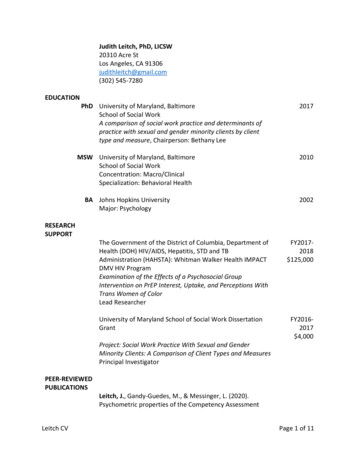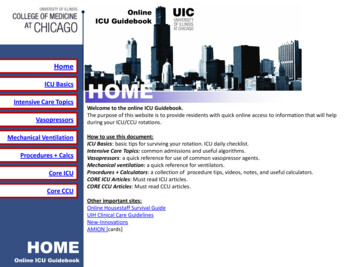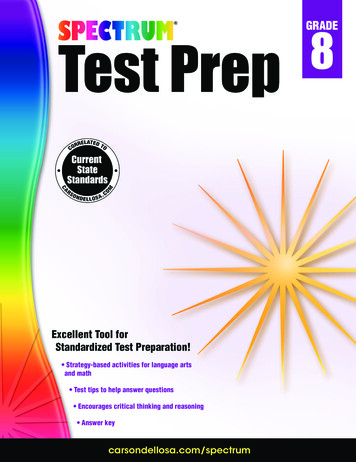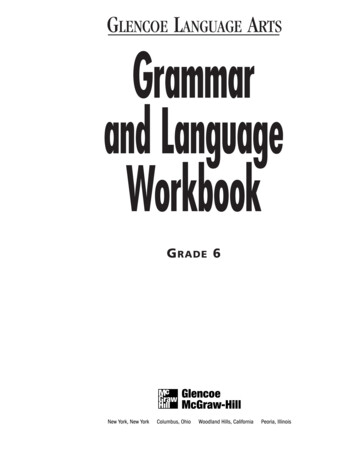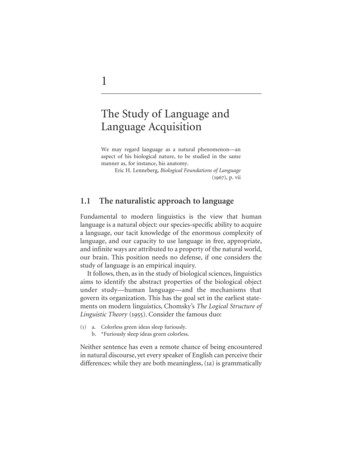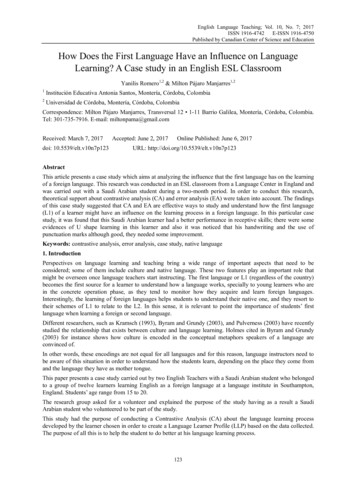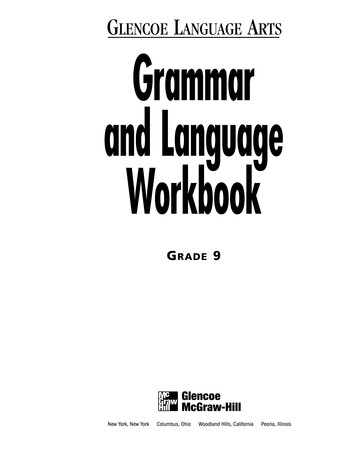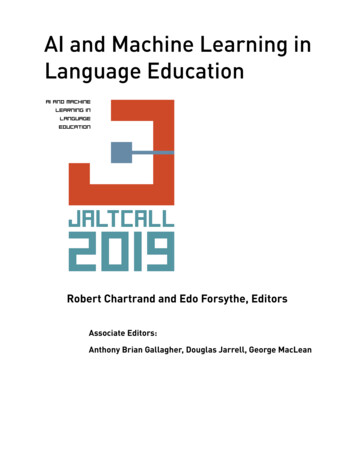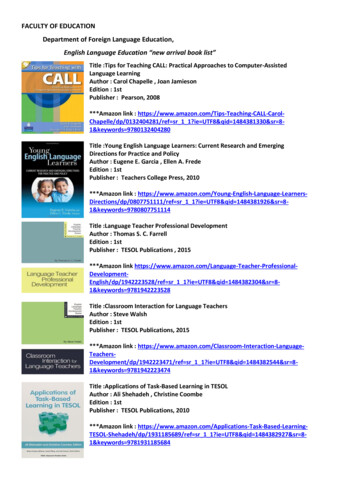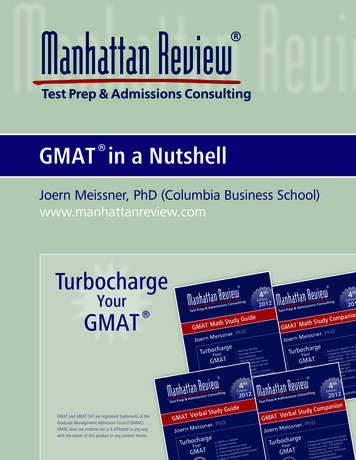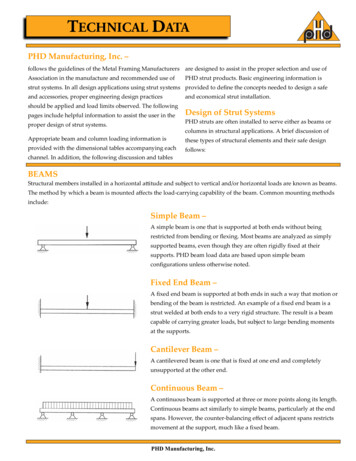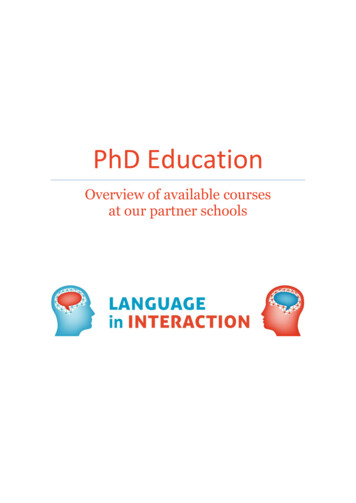
Transcription
PhD EducationOverview of available coursesat our partner schools
Table of Contents INTRODUCTION . 5 DISCIPLINARY COURSES . 6 Donders Graduate School . 6 Advanced Computational Neuroscience (6 EC) . 6 Animal Models for Brain function and Disorders (6 EC) . 6 Attention and Performance (6 EC) . 7 Cognition and Complexity (6 EC) . 8 Cognitive Control and Decision Making (6 EC) . 8 Cognitive Neuroscience of Memory (6 EC) . 9 Computational Neuroscience (3 EC) . 10 Developmental Cognitive Neuroscience (6 EC) . 10 Early Onset Neurodevelopmental Disorders (6 EC) . 11 First Language Acquisition (6 EC) . 12 Molecular and Cellular Neurobiology (6 EC) . 12 Motor Control (6 EC) . 13 Neurobiology of Language (6 EC) . 13 Neurobiology of (mal)Adaptation (6 EC) . 14 Neurogenetics (6 EC) . 14 Neuroimaging I (6 EC) . 15 Perception (6 EC) . 16 Psychology of Learning (6 EC). 16 Quantitative Brain Networks (6 EC). 17 Sentence Production and Comprehension (6 EC). 17 Social Neurocognition (6 EC) . 18 Structural Aspects of Language (6 EC) . 19 The Auditory System (3 EC) . 19 Using and Acquiring Multiple Languages (6 EC) . 20 Word Recognition and Production (6 EC) . 20 ILLC - Master of Logic . 22 Advanced Topics in Computational Semantics (6 EC). 22 Cognition and Language Development (6 EC) . 22 Computational Dialogue Modelling (6 EC) . 23 Foundations of Neural and Cognitive Modelling (6 EC) . 23 Logic and Conversation (6 EC) . 24 Meaning, Reference and Modality (6 EC) . 24 Philosophy of Cognition (6 EC) . 25 Rationality, Cognition and Reasoning (6 EC) . 25 Semantics and Cognition (6 EC) . 26 Centre for Language Studies Research Master Language and Communication . 27 Child Bilingualism (6 EC) . 27 Communication and persuasion (6 EC) . 27 Computational Psycholinguistics (6 EC). 28 Foundations of Language and Communication (6 EC) . 28 Introduction to Language and Speech Technology (6 EC) . 29 Multimodal Context of Language: Gesture and Sign (6 EC). 29 New ways of analyzing syntactic variation (6 EC) . 30 Non-nativeness in communication (6 EC). 31
Psychology of Language and Cultural Cognition (6 EC) . 31Sign language and bilingualism (6 EC) . 32Speech Production and Comprehension (6 EC) . 32(Automatic) Speech Recognition (6 EC) . 33The Syntax-Semantics Interface (6 EC) . 34 TECHNICAL COURSES . 35 Donders Graduate School . 35 Advanced Brain Computer Interfaces (6 EC) . 35 Advanced Math (3 EC) . 36 Advanced Neuroscience Techniques (6 EC). 36 Basic Mathematics (3 EC) . 37 Cognition and Complexity (6 EC) . 37 Machine Learning (3 EC) . 38 Neural Information Processing Systems (6 EC). 38 NeuroImaging II: Electrophysiological Methods (6 EC) . 39 Neuroimaging II: Haemodynamic methods (6 EC). 40 Practical ERP training (3 EC) . 40 International Max Planck Research School for Language Sciences . 41 Introduction to Python Programming (1.0 EC) . 41 Mixed Effect Models in R (0.5 EC) . 41 ILLC - Master of Logic . 42 Deep Learning for Natural Language Processing (6 EC). 42 Natural Language Processing 1 (6 EC) . 42 Natural Language Processing 2 (6 EC) . 43 Structures for Semantics (6 EC) . 44 School for Information and Knowledge Systems . 45 Advances in Information Retrieval (1 EC) . 45 Foundations of Data Science: Data Mining (1 EC) . 45 Kaleidoscope Data Science (1 EC) . 45 Knowledge Representation and Reasoning: Foundations and Applications (1 EC) . 45 Mathematical methods for IKS (1 EC). 45 Research methods and methodology for IKS (2 EC) . 45 Trends and Topics in Multi Agent Systems (1 EC). 45 Centre for Language Studies Research Master Language and Communication . 46 Linear Mixed Effects Modeling (3 EC) . 46 Text and Multimedia Mining (6 EC) . 46 Donders Institute . 48 Toolkits (1 (3day), 1.5 (4day) or 2 (5day) EC). 48 Radboud University . 49 Statistics for PhD candidates by using SPSS (2 EC; English and Dutch course) . 49 SOFT SKILL COURSES . 50 Donders Graduate School . 50 Academic writing (3 EC). 50 Communication in Cognitive Neuroscience (6 EC) . 50 International Max Planck Research School for Language Sciences . 52 Data Visualization (0.5 EC). 52 Illustrator Workshop (no EC) . 52 Peer Review (1 EC) . 52
Radboud University . 53 Achieving your goals and performing more successfully in your PhD (1.5 EC; English course) . 53 Advanced Conversation (1.5 EC; English course) . 53 Analytic Storytelling (1 EC; English Course) . 54 Career guidance for international PhD's (No EC; English course) . 54 Design and Illustration (1 EC; English course) . 55 Digital tools (No EC; English course) . 55 Diversity & Inclusion (No EC; English course) . 55 Education in a nutshell (1 EC; English course) . 56 Effective Writing Strategies (3 EC; English course) . 56 Entrepreneurship and Innovation for PhD-students (3 EC; English course) . 56 Grant Writing and Presenting for Funding Committees (1 EC; English course) . 57 Loopbaanontwikkeling in korte workshops (No EC; Dutch Course) . 57 Mindfulness-Based Stress Reduction (No EC; English course) . 58 Optimizing the Relationship with your Supervisor (1 EC; English course) . 59 Poster Pitching (1 EC; English course) . 59 Presentation Skills (1.5 EC; English Course) . 59 Project Management for PhD candidates (2 EC; English course) . 60 Science journalism and communication (3 EC; English Course) . 61 Solliciteren en netwerken (No EC; Dutch course) . 61 The art of finishing up (1 EC; English course) . 62 The art of presenting science (1.5 EC; English course) . 62 University Teaching Qualification (No EC; English course) . 62 OTHER . 63 School for Information and Knowledge Systems . 63 Advanced Components . 63 Netherlands Graduate School of Linguistics . 63 Summer and Winter Schools . 63 Local Courses and Extracurricular Activities . 63
INTRODUCTIONThis guide is meant for all PhDs within the Language in Interaction (LiI) project and provides anoverview of available courses at our LiI partner schools.LiI aims at teaching and training the next generation of leading scientists in its field ofresearch. To provide an optimal educational environment for all junior scientists, Language inInteraction exploits, coordinates, and integrates the already existing excellent graduateprogrammes in its field. These are:- Donders Graduate School (DGS)- International Max Planck Research School for Language Sciences (IMPRS)- Institute for Logic, Language and Computation PhD Programme (ILLC)- Netherlands Graduate School of Linguistics (LOT)- Netherlands Research School for Information and Knowledge Systems (SIKS)Each LiI PhD student is allowed to participate in courses of the above-mentioned graduateschools against rates applicable for internal students; thus without additional costs. Inaddition, on their own initiative LiI PhDs can opt for lab rotations at all PI groups participatingin LiI, enabling optimal, individualized curricula.Next to all available courses from our LiI partner schools, additional courses are listed that areNOT offered by our LiI partner schools but directly by a university or affiliated institute. Thesecourses are NOT freely accessible for all LiI PhDs. We still chose to list these courses as they areof great value for a large part of the LiI PhDs.All courses in this document are subdivided into the categories "disciplinary-", "technical-" and"soft skill courses". You may use the table of contents to find an interesting course. By clickingthe accompanying page number, you will automatically be redirected to summary informationon this course. If more elaborate information on a course is available on an external webpage alink is provided below the course title.
DISCIPLINARY COURSESDonders Graduate SchoolAdvanced Computational Neuroscience (6 EC)(link)PrerequisitesNeurophysics 1 and Neurophysics 2ObjectivesAfter successful completion of the course, you will be able to understand the computationalneuroscience literature, in terms of being able to implement and critically evaluate these modelsin terms of whether they address the underlying neuroscience problem, and write computerprograms to implement a number of common computational models.ContentsThe course consists of two parts. One part is given by Kappen and consists of the followingtopics: stochastic neuron models and networks, deep networks and sparse
Donders Graduate School Advanced Computational Neuroscience (6 EC) (link) Prerequisites Neurophysics 1 and Neurophysics 2 Objectives After successful completion of the course, you will be able to understand the computational neuroscience literature, in terms of bei
